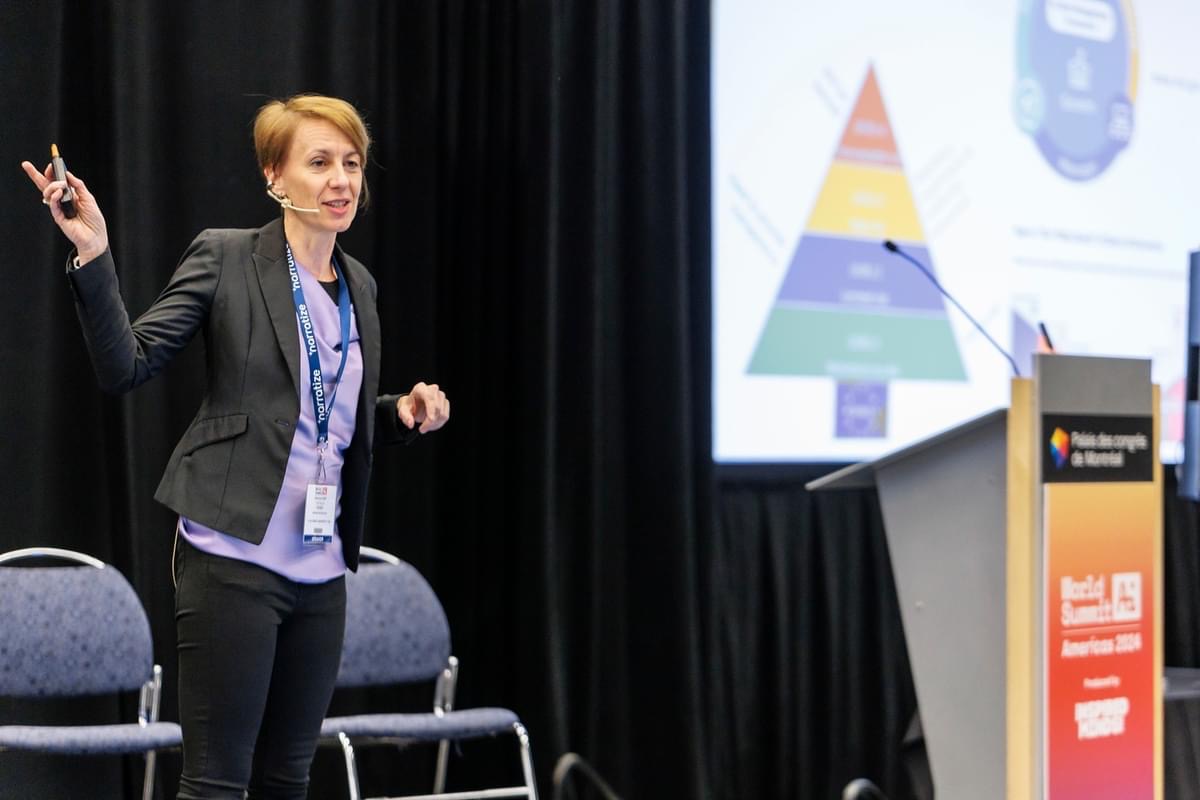Katalin Feher, an internationally recognized researcher and expert in AI strategy, technological foresight, and generative AI, spent a highly impactful term at Concordia University’s Applied AI Institute through the transatlantic Horizon Europe NGI Enrichers program. She set out to address a pressing question: how can we effectively anticipate and responsibly govern AI’s societal impact—through a method that are both academically grounded and policy-ready?
Through strategic foresight, she and a curated network of 150 experts co-developed a scalable method for identifying certainties and uncertainties in responsible AI, evaluating their broader societal implications. The core team delivered a consensus map and a human-centric research design for the next decade, alongside high-profile academic publications and keynote talks at global AI summits—with more underway.
Katalin chose Concordia for its bold interdisciplinarity and cross-industry collaboration in a global AI hub – Montreal, Canada –,advancing socially responsible innovation. With the continued support of the transatlantic Horizon Europe NGI program, the journey advances—its next stops: the United Nations Global Digital Cooperation (New York, US) and AI Horizon 25 to FP10 preparations for the EU’s Framework Program 2028–2034 (Davos, CH).
Book publication: Generative AI, Media, and Society
Katalin Feher’s book Generative AI, Media, and Society (Routledge, 2024) offers a timely and forward-looking exploration of how generative technologies are reshaping societal systems, cultural practices, and the soft power of AI and emerging technologies. The book blends academic insight with strategic foresight to decode the disruptive—and often contradictory—impacts of AI on policy making, business models, public discourse, and credibility.
The book argues that Generative AI—from ChatGPT to LLaMA—represents an evolutionary leap in AI, shifting from automation to co-creation and redefining how AI agents are distributed. Positioned at the intersection of technology, society, and governance, the book introduces an original framework of “generative logic” to guide researchers, practitioners, and policymakers through the emerging ecosystem of human-machine co-intelligence. From entertainment to education, from start-ups to states, Generative AI, Media, and Society traces how synthetic content, algorithmic authorship, and human–AI collaboration are transforming both human-driven intelligence and social trust.
The flagship research behind the volume was supported by the transatlantic Horizon Europe NGI grant. During the fellowship, she tested and refined her generative foresight framework through expert collaboration, workshops, and policy-oriented research design. These insights directly shaped the book’s structure and findings, making it both a scholarly and actionable output. Published by Routledge in New York and London, the volume reflects Katalin’s commitment to bridging scientific, industrial, and policy perspectives. It has already generated significant academic interest, from global AI summits to leading academic journals under review, while shaping international discussions on AI innovation, strategic foresight and soft power of emerging technologies.
Fellowship project
Katalin Feher’s AI Compass is a globally minded, forward-looking initiative at the intersection of AI strategy, tech foresight, and society, aimed at shaping inclusive, policy-ready innovation. It transforms advanced academic research into actionable insight and practical tools for understanding how synthetic futures and human–AI collaboration are redefining credibility, governance, and strategic narratives across cultures, disciplines, and global systems.
Improved in her Horizon Europe NGI fellowship and further developed during her role as principal investigator in responsible AI at Concordia University’s Applied AI Institute, AI Compass applies generative foresight, scenario thinking, and co-intelligence frameworks. These are used in academic publishing, high-level policy advising, and strategic consultations—spanning global AI summits and expert forums shaping future policies.
The initiative is a platform for bridging academia, policy, and industry in AI and digital transformation. Katalin currently serves as Chief Scientific Advisor and Chair of AI Horizon 25 Davos, preparing inputs for the EU FP10 Framework Programme (2028–2034). She is also an invited scholar at the UN OSPOs initiative (US), an AI expert for the European Commission (MSCA, REA, EISMEA) and the NYU’s FORGE (Future of Rights and Governance) intiative. Accordingly, AI Compass significantly shape the future of responsible, human-centered AI governance.
Paper Publication : Strategic Foresight in AI Governance: The Archer Model for Responsible AI Futures
Our preprint introduces the Archer Model, developed through an EU–North America collaboration supported by the NGI Enrichers Fellowship. This strategic foresight framework supports policymakers to act on Responsible AI (RAI) with an immediately applicable, hands-on approach.
Co-created through expert workshops and scenario-driven consensus mapping, the model bridges academic insight and practical governance. It integrates cognitive, ethical, and technical foresight to deliver tools that support inclusive, future-proof decision-making.
Key outcomes include a policy toolkit tailored for RAI implementation and a scalable research model for cross-sector alignment. The model responds to urgent gaps in AI explainability, sustainability, and fairness, reinforcing multistakeholder agency in shaping the future of AI.
Rejecting hype-driven solutions, it offers a clear pathway to embed actionable foresight into governance. Archer contributes universally applicable insights—equipping both public and private actors with strategies for ethical, resilient AI policy in an era of rapid technological disruption.

